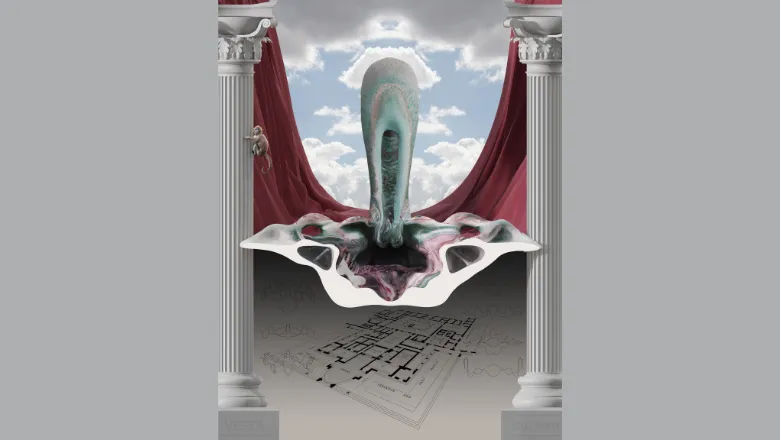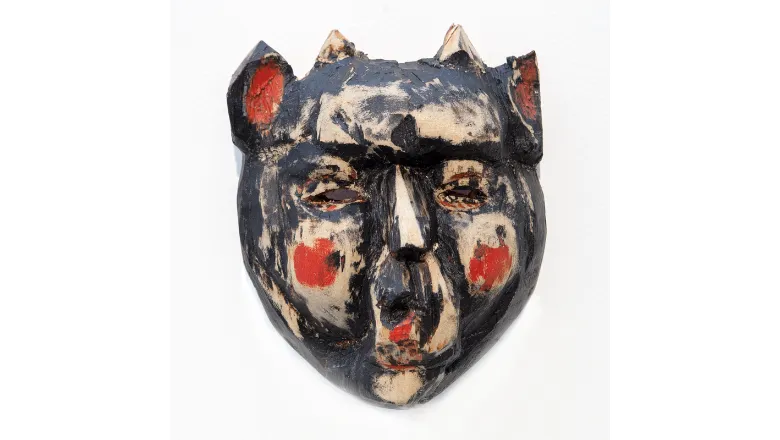The exhibition at 171 Strand displays interesting artefacts and objects showcasing King's research.

The Domina's Fresco, 2023, Marisa Müsing
Pasts to Come, Art, Archaeology and Speculative World-Building, explores how the deep past has inspired artists to rethink our relationship to bodies, sexuality, and spirituality.
The collection will be displayed at the Curiosity Cabinet between 13 May- 30 August 2024. This space is dedicated to 'curious people and curious objects'. Opened on the Strand on 8 November, and created by the Faculty of Arts & Humanities and King's Culture, the Curiosity Cabinet tells the story of some extraordinary arts and humanities research by staff and students at King's - using the physical and digital 'antiquities and oddities' that have inspired or emerged from it.
While artworks encountered in a gallery are often understood to be products of individual inspiration, archaeological artefacts in museums are generally interpreted as cultural expressions that represent communal values or debates. If considered as artefacts, what collective values or conversation, what relationship to bodies - our own and other's - could these objects be celebrating or exploring? The works in Pasts to Come invite the viewer to imagine how they could function in rituals, mythology, or daily life of a past society (or perhaps of one yet to come).
Rather than referencing a particular culture or time, Pasts to Come presents creative amalgams and reinventions of the archaeological past. The exhibition takes place in dialogue with the research project Matriarchal Pasts and Modernist Futures by Dr Frederika Tevebring, British Academy Postdoctoral Fellow, Department of Classics. This project focuses on the reception of spectacular archaeological finds from prehistoric Europe, made in the first half of the twentieth century, that revealed women in prominent positions. These discoveries, together with increasing knowledge about non-European cultures, implied that social institutions such as social classes, royalty, marriage, and the nuclear family were only some ways out of many to organise relationships, divide work, and allocate power.
Pasts to Come aims to explore the relationships between the use of the past to imagine futures, today and a hundred years ago.
A collaboration with artists:
Marisa Müsing
Hot Desque (Lizzy Drury and Neena Percy)
William Cobbing
Fiona Berry
Fani Parali

This project focuses spectacular archaeological finds from prehistoric Europe, made in the first half of the twentieth century, that revealed women in prominent positions. These discoveries, together with increasing knowledge about non-European cultures, implied that social institutions such as social classes, royalty, marriage, and the nuclear family were only some ways out of many to organise relationships, divide work, and allocate power.
My current research project "Matriarchal Pasts and Modernists Futures" describes how, in the first half of the twentieth century, the theory of a prehistoric matriarchy inspired artist and political thinkers to question aesthetic and political hegemonies. I am interested in the ways artists have approached the past not just for aesthetic inspiration, but in search for alternative structures to those of modern (European) society. Artists, then and now, have asked whether the deep past can offer new models of, for example, how to relate to the natural world, allocate resources and decision making in a society, and imagine family and gender roles. The artists in this show are particularly interested in imagining ways of relating to the body (e.g. through mythology and ritual) that goes beyond contemporary gendered terminology.
Dr Frederika Tevebring, British Academy Postdoctoral Fellow
Scattered around the display is Tevebring's personal collection of souvenirs, charity shop finds, and found objects. Together, they form an ill-defined and unruly pantheon of personal divinities.
Pasts to Come at the Curiosity Cabinet is accompanied by Modernity's Prehistory, Reconstructing the Past, Imagining the Future, a Celebration and Curator's Presentation.
The Curiosity Cabinet is a rolling free-to-visit exhibition. You can find out more about it here.







